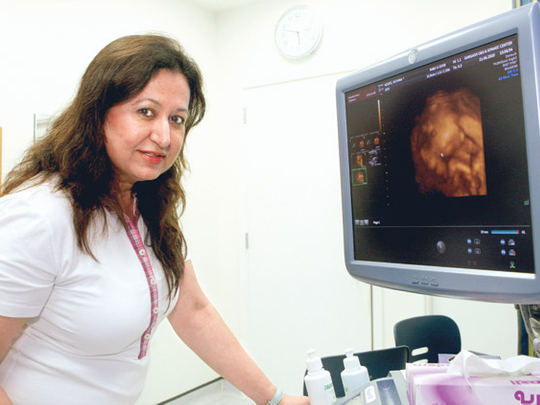
Dubai: The first Emirati woman gynaecologist believes that more men are becoming infertile today and women are marrying later in life and having fewer children.
"We are not sure what the reason is [for male infertility], maybe (one of the reasons) is because of pollutants in the environment," said Dr Husnia Gargash, consultant of assisted reproduction.
The doctor who graduated from Baghdad University in 1982, today runs a fertility clinic in Sharjah and says her work keeps her "very busy'. She also attributes change in the Emirati diet for the infertility problem.
"People are becoming fatter and age also plays an important factor,' she said.
According to a recent World Health Organisation study, there has been a decline in births in the UAE from 5.7 children per woman down to less than two children, over the past two decades.
"Earlier, girls would be married off when they were 18 or 19 years of age. Now, they get married even at 30 and even 40 years," she said, citing socio-economic reasons behind the delay in marriages. Some women wish to pursue their careers, others wish to study further and go to university, she said.
"People don't have time for children. This is the price we are paying," said the consultant, who has delivered so many babies since 1991 that she can't remember.
Recently, a non-governmental organisation was set up to see why there is a growing infertility rate in the country. She said women come from as far as Oman, Bahrain and Saudi Arabia seeking assisted reproduction.
When the woman finds out she is pregnant, the happiness on the face is something to see, said the doctor.
"We bring happiness not only to the couple but the whole family," she said.
The doctor said she resigned from government work and set up her own clinic because of many reasons. "I come from a business-oriented family and I wanted to say that I made it my way," she said.
Success rate
The doctor said the success rate in the assisted reproduction is good. The process is not cheap and costs up to Dh18,000 for an IVF (In vitro fertlisation), a process where the egg cells are fertilised outside the womb. Assisted reproduction was not allowed in the past and now many private clinics have opened across the country, said Husnia. Her clinic conducts various procedures from IVF to ICSI (intracytoplasmic sperm injection) of eggs.
"This is where we make babies," said the doctor pointing to a special room where containers of eggs are stored in liquid nitrogen. The eggs can be kept frozen for up to five years.
Fertility clinics are not allowed to freeze embryos, said the doctor.
A Federal Law has banned storage of embryos.












